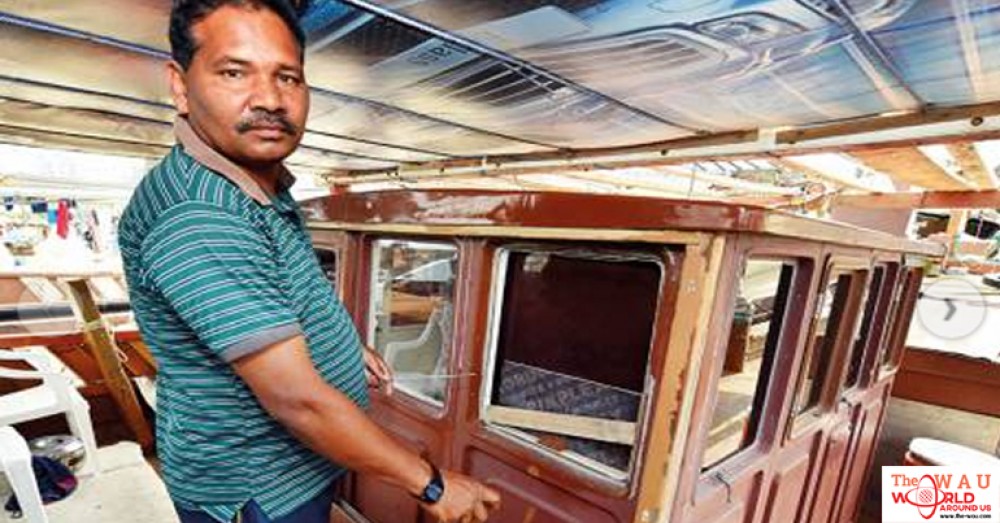The dockyard for fishing dhows at Port Zayed is an entirely another world from the bustling Abu Dhabi city. Here, some fishermen are busy readying for their next venture into the sea, while others who have anchored their vessels play video games, watch Bollywood movies on mobile phones or dry laundry.
Passers-by see hundreds of fishing boats docked at Abu Dhabi Mina Zayed next to the Fish Market, and their captains and crew members relaxing or fixing dhows, arranging ropes, strings and iron nets.
Down the street, some fishermen are busy weaving iron fishing nets called gargour (a dome-shaped fishing trap).
Gulf News went down the quayside to learn about their life and the challenges they face in their day-to-day deep-sea fishing. The fishing community says inattentiveness and underestimation during bad weather conditions may threaten their lives or could result in horrific collisions between vessels. Low visibility and windy conditions are major threats to the lives of fishermen who spend days in the deep ocean for fishing. Sometimes, they have to encounter boat collisions due to rough seas, fishermen say.
Speaking to Gulf News, Indian Dara Singh Tandle, 48, a boat captain, who was relaxing on his vessel, said, “Being in this work, there are many concerns but the major worry for us is our life when we are in the deep sea and the weather suddenly turns hostile.
“I have seen collision of fishing boats due to poor visibility. At times, the visibility level drops to zero, so we can’t see anything. We cannot even sail to a safety zone, so we stop at a point switching our emergency signals on to alert others,” he said.
Tandle asserted that boat collisions occur due to overconfidence of fishermen who start sailing in low visibility — it’s suicidal. “Due to poor network or no network at all, mobile phones can’t be trusted in deep seas, but we have a radio alarm system which sends signals to marine operations rooms who come to rescue us if we face any emergency,” Tandle said who has been fishing in Abu Dhabi for over 20 years.
" I have seen fishing boats colliding due to poor visibility. At times, the visibility drops to zero ... We cannot even sail to a safety zone, so we stop and switch our emergency signals on to alert others.”
- Dara Singh Tandle | Fishing boat captain
It takes about 20 hours to reach the fishing points, deep in the Arabian Sea, which is around 120 kilometres from the capital.
“Weather changes suddenly when strong winds start blowing and waves rise up to five to six metres. We rush back to the nearby island for shelter,” said Tandle who is from the western Indian state of Gujarat.
“It may cause collisions and topple the ship, so we sail towards the nearest Das or Zirko islands of Abu Dhabi and anchor there. We can’t do anything when wind is strong,” he said.
Das and Zirko islands are located are 170km and 140km, respectively, off the capital.
Weather bulletin
Like motorists, fishermen also seek weather-related forecasts from the reliable local weather departments on radio and websites. “Before starting our journey, we check all weather-related information on the internet, but sometimes the weather changes unexpectedly over the sea and winds become stronger.”
Three to eight people travel on a fishing dhow depending on the boat’s size and spend up to five days in the sea.
Cost involved
Most of the fishermen at Mina Zayed are from Gujarat and generally one fishing dhow brings a catch worth up to Dh10,000 on a single trip, and they go for fishing twice a month — or thrice if the weather is pleasant.
But they complain of dwindling profits due to the rising cost of fishing and equipment.
Tandle said sometimes they remain docked throughout the month due to bad weather, and it can happen in summer as well as in winter. “Generally, we work on a 50-50 sharing basis under which the Emirati sponsor takes half of the total price received for the catch and we take the other half. The fishermen manage all expenses of the fishing trip including the cost of the gargour fishing trap, diesel, ice and foodstuff,” said Tandle.
“One trip costs Dh5,000, including Dh2,000 which has to be paid to the local person on board. It’s compulsory for fishermen to have a local person on-board whenever they go for fishing,” Tandle said.
Share This Post















